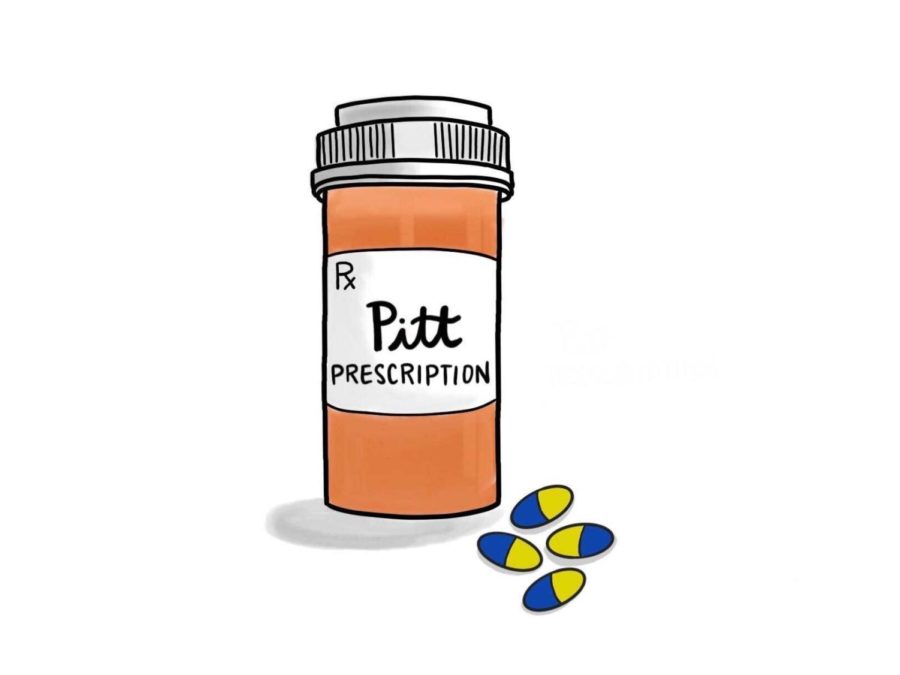The Pitt Prescription | Exploring vaccines’ roles in keeping students safe
The Pitt Prescription is a biweekly blog where student pharmacist and senior staff writer Elizabeth Donnelly provides tips on how to stay healthy in college. This edition was reviewed by Karen S. Pater, Pharm.D, CDCES, BCACP.
Shruti Talekar | Contributing Editor
The Pitt Prescription
October 18, 2020
As a college student, I’m constantly surrounded by schedules — work, class and even study schedules are perpetually on my mind as I go about my time in school, and many other students will understand this sentiment. While scheduling is an important aspect of college, especially now that many things are remote, a schedule often overlooked by many individuals is the Centers for Disease Control and Prevention’s recommended immunization schedule.
There are several recommended immunizations for people ages 19-26, and some of them are especially recommended for young adults who will attend college. It is particularly important to be up to date on these immunizations this year, with the COVID-19 pandemic occurring simultaneously with cold and flu season. These immunizations include the annual flu shot and the MMR, varicella, Tdap, HPV and meningococcal vaccines.
First, it is important to learn and understand how vaccines work. There are several different types of vaccinations available to the public, with the four main types being live-attenuated vaccines, inactivated vaccines, subunit (recombinant, polysaccharide and conjugate) vaccines and toxoid vaccines.
How do the different types of vaccines work?
Live vaccines contain weakened — also called attenuated — forms of the germs that cause diseases. These vaccines are similar to getting naturally infected with the illness, and they can produce a strong immune system response in just one or two doses. This response often can last a lifetime, as seen with the chickenpox vaccine.
Inactivated vaccines contain a dead strain of the germs that cause diseases. They usually don’t provide a response as strong as the live vaccines, so booster shots are often necessary throughout your lifetime. One example of this is the yearly flu shot, where the immunity only lasts for the current flu season.
Subunit/recombinant/polysaccharide/conjugate vaccines use small and very specific pieces of the germs to produce an immune response. These vaccines use a specific protein, sugar or casing of the germ to produce a specifically targeted response, and they can typically be used on most people, including people with weak immune systems or other long-term health conditions. These types of vaccines also typically need some sort of booster shot, as they do not provide lifetime immunity. One example of this would be the hepatitis B vaccine, HepB.
Finally, toxoid vaccines use a toxin made by germs that cause certain diseases. These toxins are usually harmful products produced by the germ, but they are not used in large enough quantities to hurt people who get the vaccine. Instead, it helps produce an immune response to the parts of the germs that cause the disease, rather than the germ as a whole, meaning the immune response is targeted to that specific toxin. These sometimes require booster shots as well to provide ongoing protection. One example of this kind of vaccine is the tetanus and diphtheria vaccine, which usually requires a booster shot every 10 years.
Now that you know how vaccines work, here is more information on the specific types of vaccines recommended to people aged 19-26 years old.
Influenza Vaccine (Inactivated IV, Recombinant IV or Live-Attenuated IV)
The annual influenza vaccine — or flu shot — is one of the most important immunizations college students could get. As mentioned in my first edition of The Pitt Prescription, the flu shot has several misconceptions associated with it. Many people believe you can get the flu from the shot (you can’t) or that healthy people don’t need to get a flu shot (everyone should get one). These misconceptions make it common for people, especially healthy young adults, to skip their opportunity of getting an annual shot.
This year, more than ever before, the CDC is urging the importance of getting your annual flu shot as soon as you can because we have a viral pandemic occurring at the same time as cold and flu season.
Although the flu shot will not protect you against COVID-19 infection, it will significantly lower your chance of getting the flu, and it is proven that the flu shot also helps lower the severity of flu symptoms if you do contract the flu virus. Making sure you’re protected against the flu will be beneficial for your own health but will also help ensure our hospitals are not overwhelmed with both flu and COVID-19 patients.
You should get your flu shot sometime near the end of September or early October each year, as that is typically when flu season begins. Flu season has peak months in December and February and can last as long as through April, so getting your shot in a timely manner is encouraged.
Measles, Mumps, Rubella Vaccine (MMR)
The MMR vaccine protects against measles, mumps and rubella infections. MMR is a weakened live-virus vaccine, which means a small infection will occur in the body, to be fought off by the immune system. The immune system will then recognize these types of infections in the future and have much more success in fighting them off, therefore indicating the person has some lasting immunity against measles, mumps and rubella.
The CDC recommends the MMR vaccine for all adults in the 19-26 year age range, but college students are recommended to get an extra dose since they live in close quarters with other students. The official CDC recommendation for college students is to obtain a two-dose series at least four weeks apart if no previous MMR dose was given. If you previously have received one dose of the MMR vaccine, then another dose should be administered.
Varicella Vaccine (VAR)
The varicella vaccine helps protect against the varicella zoster virus, which is the virus that causes chickenpox. The vaccine is available both as an individual vaccine or in combination with MMR, when it becomes an MMRV vaccine. The individual vaccine for varicella is called Varivax and it is recommended for people ages 12 months and older.
It is a two-dose series, meaning you will get two separate injections over a period of time. The recommended age for the first vaccination is 12-15 months, followed by a second injection at 4-6 years. If you were not vaccinated against chickenpox as an infant, then it is recommended to get the two injections as an adult with at least four weeks between each injection.
Tetanus, Diphtheria and Pertussis Vaccine (Tdap)
The Tdap vaccine helps prevent tetanus, diphtheria and pertussis infections and it is the follow-up (booster) to the DTaP vaccine. The DTaP vaccine is a five-dose series that should be started at two months of age.
Both pertussis and diphtheria are highly contagious and can spread from person to person. Tetanus does not spread person to person, rather it can enter the body through scrapes, cuts or other wounds. Pertussis is also known as whooping cough and is often fatal in babies, which is why this vaccination is important. The Tdap booster is available for children more than 7 years old and the DTaP vaccine is only available starting at 6 weeks old, so herd immunity (when the majority of the population is immune to an illness) is especially important in preventing the spread of pertussis and diphtheria to newborn infants.
It is recommended to receive the first dose of the Tdap vaccine between 11 and 12 years of age, with a booster shot every 10 years if you received your five-dose DTaP series. This is important for college students because many of us are reaching the 10-year point after our original immunization and will need to get the booster shot soon. If you never received DTaP, then it is recommended to complete a three-dose series — get one dose of Tdap and then wait four weeks to receive the next dose. Then six months to a year after the second dose, get a third dose. A booster shot every 10 years is also necessary with this method.
Human Papillomavirus Vaccine
The HPV vaccination protects against the human papillomavirus, which can cause health issues like genital warts and cancers like cervical cancer. HPV is a sexually transmitted virus and can be passed even when someone is asymptomatic and feels fine. It is important adolescents and young adults are protected against this virus. Children as young as 9 years old can receive the HPV vaccine, but is typically recommended to start the series at ages 11-12.
For 9-14 year olds, this is a two-dose series with six months to a year between doses. For teens ages 15 and older, it is recommended to get a three-dose series with at least four weeks between the first and second dose and at least 12 weeks between doses two and three. It is a good idea for college students to be up to date on this dosing series as this is a sexually transmitted virus.
Meningococcal Vaccine (MenACWY)
The MenACWY vaccine prevents different strains of meningococcal disease. Meningitis can come in many different forms (bacterial, viral, fungal and more), and it causes the membranes of the brain and spinal cord to swell.
Viral meningitis is the most common form of this disease, and some strains have the potential to spread through close contact with others. Specifically with the MenACWY vaccine, it is recommended that first-year college students get vaccinated with one dose of the vaccine, especially if they will live in on-campus housing such as dorms. This is one of the vaccines required by Pitt, along with the MMR and VAR vaccines (although there are some exemptions to this rule).
Overall, these vaccines are recommended in order to keep yourself and everyone around you safe and healthy. The Food and Drug Administration follows a strict vaccine approval process that ensures the quality, efficacy and safety of these immunizations. There are some avid anti-vaxxers, people who do not believe in vaccines, but there is absolutely no proven data showing that vaccines are harmful.
There is one specific anti-vax argument that is often heard — vaccines cause autism. This argument is first and foremost untrue, but also extremely disrespectful to the autism community. This argument stemmed from an unreliable study released in 1998 that was later fully retracted because several aspects of it were incorrect. Not only was his research fully repealed, but the doctor who led the study was stripped of his medical license in the United Kingdom because of how serious his misconduct was. To this day, there is not one single piece of credible evidence that supports the sentiment that “vaccines cause autism.”
Vaccines are the best way to prevent certain infections and diseases, so it is our duty as individuals to make sure we follow the recommendations of health professionals to keep our communities safe. Reach out to your doctor to make sure you’re up to date on all of these immunizations, and don’t forget to visit your local pharmacy or Pitt Student Health’s Free Flu Clinics for your yearly flu shot!
Elizabeth writes primarily about self-care and pharmacological topics. You can reach her at [email protected].








